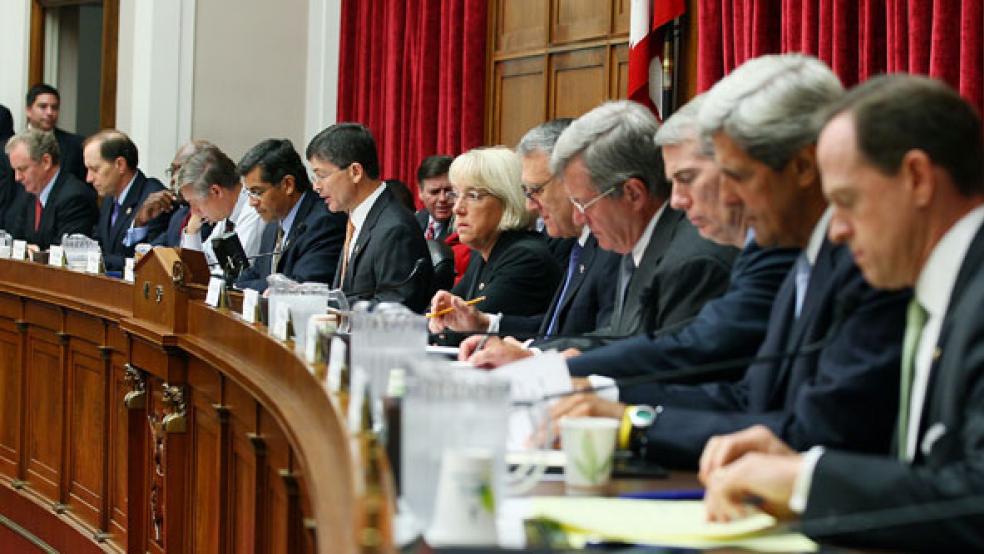Get ready for what could be the next big deficit stalemate: budget cuts to defense spending.
Republicans and Democrats have drawn lines in the sand on defense spending, putting more pressure on the newly formed deficit-reduction “Super Committee” to compromise on a proposal to reduce the deficit by at least $1.2 trillion over the next decade. Republicans say they want to see the Pentagon’s budget spared and instead trim entitlement programs like Medicare and Medicaid, while Democrats insist on raising tax revenues on high-income individuals and corporations. At the same time, many members represent states that are home to large companies with hefty defense contracts. For example, Democratic panel member Sen. John Kerry represents Massachusetts, where Raytheon, fourth in defense contracts this year at $7.3 billion, is based.
The 12-member bipartisan Super Committee has about six weeks to produce a bill. If it deadlocks and fails to come up with legislation by November 23 or agrees to less than $1.2 trillion, automatic across-the-board spending cuts kick in, including $600 billion to the Pentagon’s budget. A deal must be struck ahead of the Thanksgiving deadline in order for the Congressional Budget Office to estimate cost savings.
Defense Secretary Leon Panetta has warned of dire consequences if there are more cuts to defense spending than the $400 billion planned by the Obama Administration over the next decade. Panetta has said that these cuts, part of the debt-reduction package passed in August to slice about $1 trillion from agency budgets over 10 years, are already proving difficult. A second round of cuts, totaling as much as $1 trillion over the next 10 years under the worst-case scenario, would be disastrous, he said.
Senate Republican Whip Jon Kyl of Arizona, warned last week that he would quit the Super Committee if there were any cuts beyond the approximately $400 billion mandated by the debt-ceiling deal agreed to in August. Kyl said the $1.5 trillion in cuts should come from Social Security, Medicare, and Medicaid. Kyl, a veteran of deficit-reduction talks, walked out of the Joe Biden-led discussions earlier in the summer over demands to raise taxes.
“I don't think any of us want to see … defense cuts at that level take hold because they are disproportionate in terms of what they do to the Pentagon,” House Majority Leader Eric Cantor (R-Va.), said at a press conference on Capitol Hill Monday. “But there is no way you can defend every dollar and cent being spent at the Pentagon, just like you can't defend it somewhere else.
Cantor said everything should be on the table and he is for improving efficiency, but “we still face a threat and we still have to make sure that we maintain our ability to [defend the country]”
Cutting defense spending has been a do-not-enter zone for lawmakers for decades but given the high stakes, that may change and give the Super Committee incentive to find at least $1.2 trillion in deficit savings. Last year, former Defense Secretary Robert Gates acknowledged that given the fiscal crisis the U.S. faces, the military could no longer be immune from cuts. The Pentagon’s budget over the last decade, defense spending has increased 81 percent, with $687 billion spent in 2010 alone. It now accounts for half of all discretionary spending.
Meanwhile, outside groups are pressing the committee to trim “well beyond” the $1.2 trillion the panel has been charged to find. “The heat is on,” said former Senator Alan Simpson at a National Press Club event Monday afternoon. Simpson and more than 60 former government officials and business executives sent a letter to the panel urging its members to “go big” and look for deficit savings in the $4 trillion range, the same amount first suggested in December by the President’s deficit-reduction commission
Simpson and Erskine Bowles, former co-chairs of the commission, stressed that the tougher the proposal, the more people will come aboard. Bowles said he was “optimistic” that the panel will “go big” because there is a wide menu of past deficit options to choose from.
“We spend more than the next 14 largest countries combined on our national defense,” Bowles said. “That is simply not sustainable. It causes a hollowing out of the country because there are not the resources available to us like education and infrastructure.”
The Super Committee is scheduled to meet again today.





